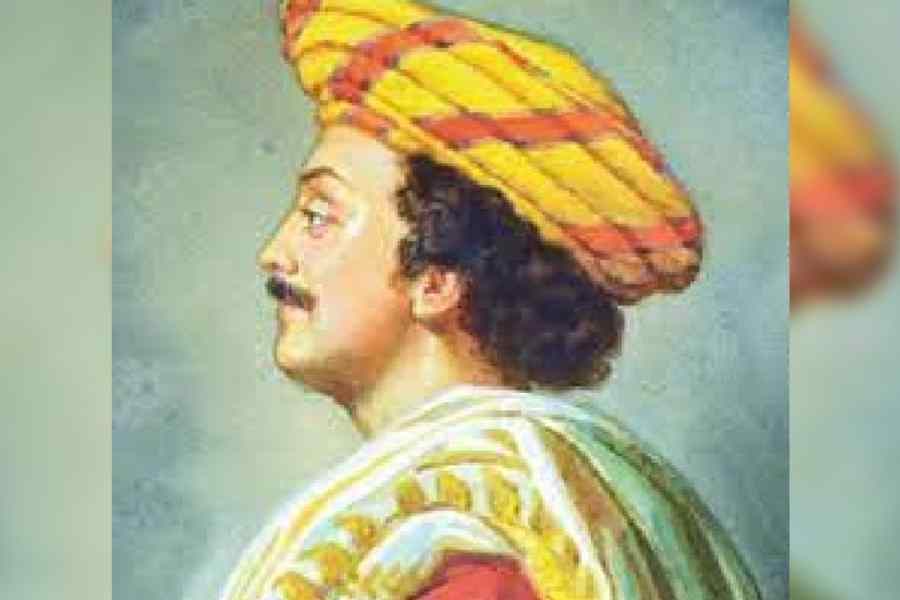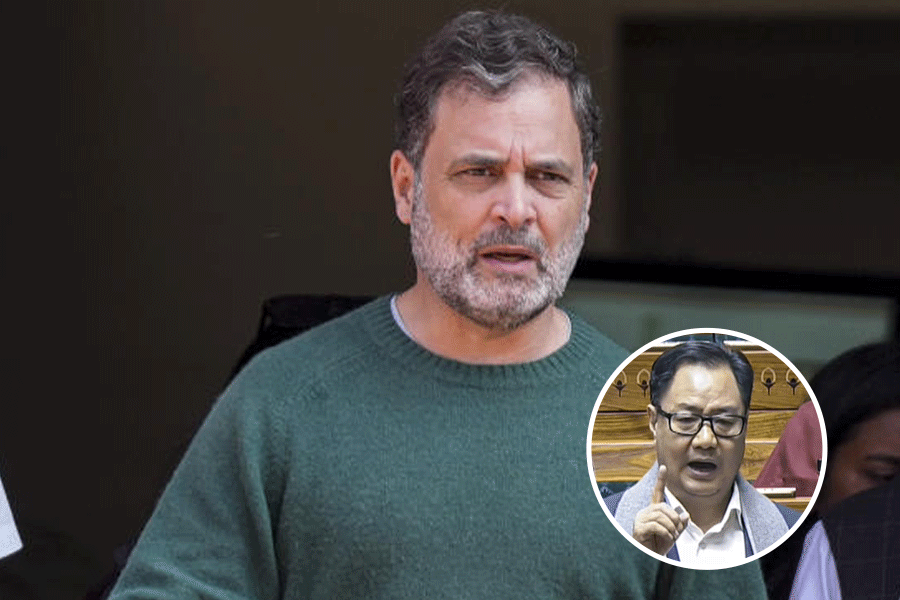A BJP minister’s vilification of Raja Ram Mohan Roy as a “British agent” has united Trinamool, the Congress and the CPM in outrage and left his party’s embattled Bengal unit struggling to contain the damage.
Madhya Pradesh higher education minister Inder Singh Parmar, who made the comment on Saturday, issued a statement of “apology and repentance” in a video on Sunday, apparently after requests from the Bengal BJP and instructions from the national leadership.
He claimed it was a slip of the tongue and that he had always respected Roy.
Parmar’s comment is only the latest in a series of insulting or incorrect statements made by BJP leaders about Bengal icons, many of them during the 2021 Assembly election campaign, allowing Mamata Banerjee to paint their party as hostile or indifferent to Bengal’s culture and history. (See chart)
With another state election just months away, Trinamool leaders pounced on Parmar’s remarks to reiterate their party’s longstanding portrayal of the BJP as “Bengali hater”.
“Ram Mohan Royji was a social reformer and ought to be respected. That sentence slipped out of my mouth by mistake. I am very sad, repentant for it. I extend my apology,” Parmar said in his retraction.
His controversial comment about Roy, hailed widely as the “Father of the Bengal Renaissance”, had come at an event to honour tribal freedom fighter Birsa Munda — ironically, one of the Bengal icons the BJP has been accused of insulting.
“Jismey ek Raja Ram Mohan Roy bhi theh, woh bhi Angrezo ke dalal ke roop mein desh mein kaam karte rahe (Raja Ram Mohan Roy, too, was one, he too kept working as an agent of the British),” Parmar said.
He accused Roy of aiding a British project of secretly promoting religious conversion by Christian missionaries.
Roy (1772-1833) was a visionary, a social and religious reformer, a polyglot and a polymath, widely regarded in India and Britain as the “Maker of Modern India”.
He challenged oppressive social customs, advocated women’s rights, and promoted modern education and rational thinking. He helped abolish Sati, founded the Brahmo Samaj, pioneered the modern Indian press and Bengali prose, and laid the humanist and universalist foundations of what is often extolled as the “Bengal Renaissance”.
Although his reformist and progressive principles have little in common with the BJP’s ideology, Prime Minister Narendra Modi had surprisingly evoked Roy while launching his party’s Bengal campaign for the general election.
At a rally in Arambagh on March 1 last year, Modi had hailed Bengal as the land that honours “Matri Shakti” and lauded Roy for his pioneering role in empowering women. He claimed that Roy had inspired his own work.
Trinamool Rajya Sabha member Ritabrata Banerjee accused Parmar of attacking “the very soul of Bengal”.
“The list of our icons they have defamed keeps growing,” he said. “These are attacks on the very soul of Bengal and its complex ethos that they fail to comprehend. Their Bengali-phobia is real and must
be defeated.”
Trinamool spokesperson Arup Chakraborty said: “My Ram is Raja Ram Mohan Roy; my Ishwar is Ishwarchandra Vidyasagar; my Thakur is Rabindranath (Tagore).”
He added: “Bengal will keep reminding these bohiragoto jomidar (outsider feudal lords) that you are torchbearers of the legacy of apologising to the British, of Vinayak Savarkar, of acting as agents of the British Raj to help weaken the Independence
movement.…
“You are the inheritors of the RSS, the Hindu Mahasabha and their ignominious role while the British ruled India. We got our freedom because of the sacrifices made by Bengal and its people.”
CPM state secretary Md Salim said that all those who stood for modernism and social reform in the 19th century were anathema to the RSS.
“Roy fought for the abolition of Sati, spoke against child marriage, advocated women’s education and upheld India’s syncretic culture -- the RSS sees these as an affront to its culture of hatred,” Salim said.
Echoing him, the Congress’s chief spokesperson for Bengal, Soumya Aich Roy, said the BJP was incurably misogynist and Manubadi, which was why it failed to understand the greatness of people like Roy.
State BJP chief Samik Bhattacharya — known for his relatively moderate views — said he believed there should be the “fiercest protests” against Parmar’s
remarks.
“I will inform our national leadership and urge them to ensure this is rectified,” the Rajya Sabha member said.
“There is no scope for condoning inadequate knowledge or the refusal to acknowledge the gigantic, international, immeasurably lasting contributions made by the Raja and how they shaped generation after generation in what is now multiple countries.”
He added: “But the way Trinamool has been going on about this (Parmar’s) remark is something I cannot
agree with.”
Historian Kanad Sinha said people who believe in Hindutva find it difficult to fathom Roy’s greatness.
“Liberal humanism combined with cultural pluralism, and a uniquely pluralist, composite cultural identity of Bengal was formed over centuries, the earliest notable figure of which is Raja Ram Mohan Roy,” Sinha, who teaches ancient Indian and world history at the Sanskrit College and University, said.
“Roy’s monotheism was in the form of the revisionist Brahmo movement, which stood on the foundations of a critique of mainstream Hinduism and its ritualistic aspects. The monotheistic idea of the Brahmo movement was based on the Upanishads, yes... but also on the Quran. And, at a later stage of his (Roy’s) life, on Christianity.”
He added: “Such complex nuances of the religio-social or cultural ethos of Bengal, or the profundity of Roy’s philosophy, are not something that Hindutva, with its monolithic and uniformist understanding, can comprehend.”
BLOOPERS, BARBS & BOORISHNESS
Some Bengal icons targeted by the BJP
Vidyasagar: His bust at Vidyasagar College, Calcutta, was vandalised at the tail end of an Amit Shah road show on May 14, 2019.
Tagore: On December 9, 2020, @BJP4Bengal posted that Tagore was born in “Bishwabharoti”. He was actually born in Jorasanko, Calcutta. On November 6, 2025, party MP Vishweshwar Hegde Kageri claimed Tagore had written Jana Gana Mana “to welcome the British official(s)”, and argued that Vande Mataram should get more prominence.
Netaji: BJP supporters chanted “Jai Shri Ram” and jeered Mamata Banerjee during Netaji’s birth anniversary celebrations at Victoria Memorial on January 23, 2021, before a silent Narendra Modi.
Vivekananda: On December 24, 2023, Union minister Sukanta Majumdar said: “Those saying football is better than reading the Gita, they are but Leftist products.”
Birsa Munda: In November 2020, Amit Shah garlanded a roadside statue of an anonymous tribal hunter in Bankura, mistaking it for a memorial to freedom fighter Birsa Munda.
Sri Chaitanya: On January 9, 2021, BJP president J.P. Nadda described a temple at Jagadanandapur, Katwa, as Chaitanya Mahaprabhu’s birthplace, sparking a state-wide backlash. Katwa is linked to Chaitanya’s sannyas (initiation). He was born in 1486 in Nabadwip and died in 1534.
Siraj-ud-Daulah: BJP Krishnanagar South candidate Amrita Roy in 2024 titled the Murshidabad-born Siraj “a bohiragoto (outsider) Mughal”.










